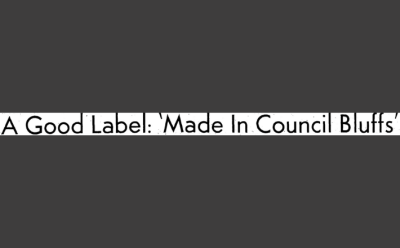
This is part four of a series focused on various company logos found in the August 21, 1958 issue of the Daily Nonpareil. A brief history of each business is included. The text from the original article read:
"Quiz a man about his home town, and he will surprise you with how little he knows-even of its most important assets. To any community a basic asset is its industry-the plants which provide paychecks for many of its citizens. And its products going out across the nation and the world are a city's most important ambassadors. Why do you know about Council Bluffs industry? The 37 insignia on this page represent a big share of the variety of products which might bear the label: 'Made in Council Bluffs.' How many do you recognize?"
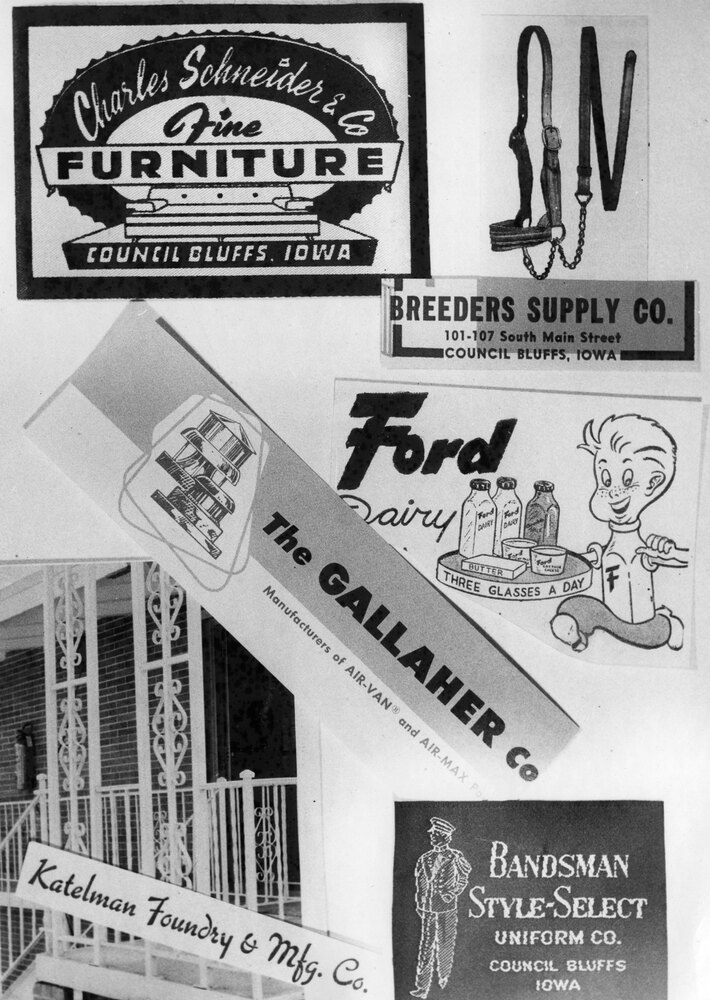
Breeders Supply Company was founded around 1924 by Herman J. McMurray. The business was started in the Wickham block at 518 West Broadway. The company manufactured agricultural products including livestock identification equipment and veterinarian tools. They primarily focused on purebred stock growers. By the mid 1920s, Breeder Supply Co. expanded and relocated to 101 South Main Street. Over the years, the company expanded to include 103, 105 and 107 South Main Street. According to a Daily Nonpareil article from December 22, 1944, “three buildings are now needed to house its sales and manufacturing offices.” This article also announced that Breeders Supply Co. was sold to “a partnership composed of Ted W. and D. L. Keller and Phil B. Freyder.” Herman McMurray remained as the manager of the company until late January 1945 when R. N. Bergquist replaced him. McMurray stated in the article that he wanted to go back to his previous job in auctioneering and was only staying with the company until the new owners found a replacement. At this point in time, the company was producing tools ranging from tattooing kits, ear markers, syringes, thermometers, and surgical knives to equipment such as surge milking machines, strainers, hog houses, and grain bins. The company also ventured into manufacturing leather products like halters and bridles. In addition to farmers in the midwest, the company also exported materials to countries such as Mexico, Canada, Jamaica, Cuba, and other countries in South and Central America. In 1957, the company was sold to the manager, R. N. Bergquist. He continued the business until the end of 1971 when the company went out of business.
Charles Schneider and Company was started in Omaha around 1946 when Charles Schneider returned from service in World War II. He discovered that there was a shortage in the furniture industry and he was approached by his mother-in-law, Rose Blumkin, to help supply furniture for her newly formed business, Nebraska Furniture Mart, in Omaha. Charles hired two furniture builders and started the Charles Schneider Upholstering Company, focusing on producing upholstered sofas and chairs. By the early 1950s, his business was successful enough that he was approached by the Council Bluffs Chamber of Commerce to move his business across the Missouri River to Council Bluffs in 1952 and set up a factory at 101 South 30th Street. The new location allowed Charles to expand the scope of his business and hire more employees. By 1955, the company had 90 employees. According to a Des Moines Register article from December 16, 1960, the company’s “speciality is medium-priced stylized furniture, all upholstered. Schneider devotes a considerable amount of his own time to creating and originating new styles and development of related projects.” The furniture frames were made at the factory on South 30th Street and everything was then assembled on the production line at 524 North 10th Street. The company rebranded to Charles Schneider and Company in the late 1950s and they developed new techniques in the furniture industry. The company established a process for producing “Fabri-Foam,” a combination of synthetic cushion material and the cover fabric without the need of an adhesive. A July 12, 1959 Daily Nonpareil article described the advantages of this process. “A number of steps in upholstering are eliminated by fabri-foam. There is less sewing and less need for springs and wood framing.” It also had the added benefit of making their furniture lighter. Charles started Future Foam in 1958 to produce Fabri-Foam. In 1963, Charles stepped down as president of the company and founded a rival company called Charles, Inc. (later renamed Charles Custom Furniture) that manufactured the same products as Charles Schneider and Co. He explained “we try to outsell each other. If a business is healthy it can stand competition.” The two rival businesses operated out of adjacent buildings at 518 and 600 North 10th Street, with Future Foam operating down the street at 400 North 10th Street. In the 1980s, Jerry and Bruce Schneider, sons of Charles, designed robotic sewing machines to “stitch overleaf designs on upholstery.” Mrs. Charles Schneider also worked at the business as the head stylist and directed the public relations department of the company. Charles Custom Furniture was last listed in the city directories in 2016. Future Foam continues to operate in Council Bluffs at the same address.
Ford Dairy Company was started in 1909 by A. C. Ford at his dairy farm located at 153 West Graham Avenue. Ford was also associated with the Ford Brothers Van and Storage Company of Council Bluffs with his brothers Ray A. and Roy V. Ford. Later when A. C. Ford moved to Colorado, his other brother Don E. Ford and his wife, Leona, took over the business around 1918. The company sold and delivered dairy products including milk, cheese, and ice cream. In 1929, Donald opened a store front for Ford Dairy at 1229 3rd Street. Around this time, A. C. Ford returned to Council Bluffs from Colorado. All of the Ford brothers appeared to have been involved in a reorganization of the Ford Dairy Company in 1930. According to a Daily Nonpareil article from August 20, 1930, new equipment was installed “to process all the dairy products in a modern method.” The company was incorporated one year later with R. A. Ford as the president but it continued to be operated by Don Ford. Around 1948, Ford Dairy moved to 163 Skyline Drive. In 1958, Don E. Ford passed away and his wife, Leona, became president of the company. Two years later, Leona’s son Eddy, became president of the business and announced a new facility would be built at 3300 South 4th Street. Ford Dairy moved in 1961 to this new location. A Daily Nonpareil article from November 20, 1960 noted that “Ford Dairy is the smallest of the four dairies serving Council Bluffs. Much of its production is in specialty lines such as ice cream mixes.” Ford Dairy closed its doors in 1968.
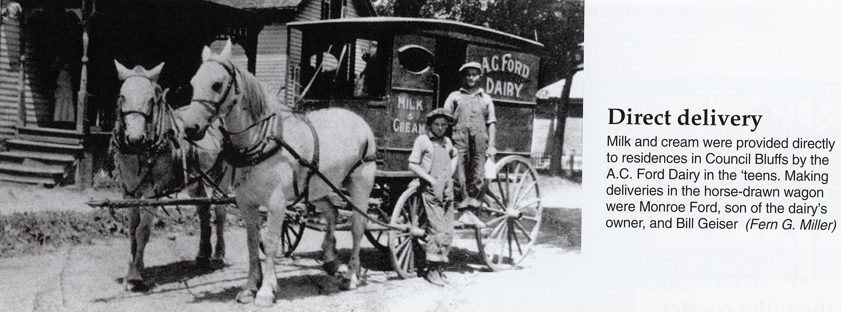
In 1955, The Gallaher Company expanded its manufacturing operations into Council Bluffs. Based out of Omaha, the Gallaher Co. subcontracted part of its production to a newly formed Council Bluffs business called the Daken Manufacturing Company to produce power exhaust equipment. This equipment “sucks the air of a building through ducts to the roof by use of a ‘squirrel cage’ wheel and centrifugal motion. The exhaust is diffused outside under a circular vent,” according to a July 17, 1955 article from the Daily Nonpareil. Daken opened its facility at 301 South 11th Avenue. Their power ventilators could be found on the roofs of apartment buildings, houses, manufacturing facilities, schools, and office buildings. Isel Solzman, manager of Gallaher Co., presented to the Rotary Club of Council Bluffs on June 23, 1955 and told members that “the ventilators are used for a wide variety of things…from indoor barbeque ovens to atomic energy plants.” By 1959, the city directories no longer listed Daken Manufacturing as an industry in Council Bluffs and instead listed the Gallaher Company at the same location on 11th Avenue. Gallaher Co. was acquired by the Airmaster Division of Hayes Industries in 1962. The production facility in Council Bluffs was transferred to Jackson, Michigan but continued to carry the Gallaher name.
The Katelman Foundry & Manufacturing Company was founded in 1925 by Julius Katelman after he bought the foundry from the previous owner, R. M. Sprague. It was located at 230 South 11th Street. The Sprague foundry produced the Sprague warm-air furnace and once Katelman took over, he continued to produce them. A February 3, 1934 Daily Nonpareil article informed readers that “the Katelman foundry is equipped to cast grey iron, brass or aluminum. Repairs for practically all makes of furnaces are cast in the factory.” The foundry also expanded its scope of business to include farm equipment and fabrication of “steel in girders, trusses or columns as required for building jobs.” The company supplied materials used in larger buildings in Council Bluffs during this time. In 1936, Julius Katelman passed away and his son Abe Katelman took over the business. During World War II, Katelman Foundry produced essential war items and also helped organize scrap metal drives for the war effort. In the post war period, Abe expanded the company’s offerings to include fencing, ornamental railings, fire escapes, smokestacks, manhole covers, along with providing custom fabrication as requested. The production of manhole covers started to account for a sizable portion of Katelman Foundry’s business. By the 1970s, they were manufacturing 3,000 to 4,000 covers annually and supplied towns and cities throughout Iowa and Nebraska. Around 1974, the Iowa Air Quality Commission required the Katelman Foundry & Manufacturing Company to “create an emission reduction program to bring the facility within the regulations,” according to a March 15, 1974 Daily Nonpareil article. The emissions in question were related to the iron melting equipment used at the facility. Abe Katelman noted in a June 14, 1981 article that the company stopped using their foundry around 1976 because “the cost to add the necessary [pollution control] equipment would have been prohibitive.” Instead the business refocused on steel fabrication. Steel would be shipped from Chicago and Katelman Foundry would furnish “steel for all of the major contractors in the Omaha-Council Bluffs area,” as well as custom build their products. Abe Katelman passed away in 1986 and the company continued to operate until it closed in 2005. “Skold Construction Services Inc. purchased Katelman Foundry, changed the name to Katelman Steel Fabrication Inc., and relocated it to a newer facility” at 2030 2nd Avenue according to an Environmental Protection Agency study of the business. All of the buildings on the former site were demolished and removed. In 2010, the City of Council Bluffs acquired the site of the Katelman Foundry and used an EPA Brownfield Cleanup Grant to treat the soil for contaminants.
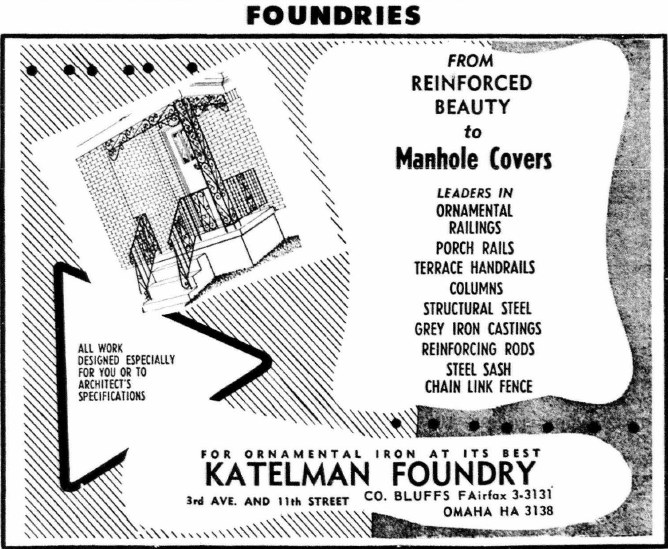
Bandsman Style-Select Uniform Company was started in 1946 by Arthur Botts and was located at 39½ South Main Street. Arthur was the general manager and designer, while his mother, Mary Clemmons, was the production manager. The business started off with a contract for making shirts and pants for jobbers. With 15 employees, the company was able to produce 1,000 pieces of clothing a week. By the 1950s, the company was specializing in custom-made uniforms, producing “sports shirts and jackets under the trade name of ‘Style-Select’” according to a Daily Nonpareil article from March 20, 1955. They also moved to 725 West Broadway during this time. Their products expanded to include uniforms for school bands (mostly Iowa, Nebraska and South Dakota), saddle clubs, policemen, ushers, lodges, cowboys, baseball, bowling and school jackets. Style-Select Uniform Co. moved to a new location at 2424 West Broadway around 1964. An April 26, 1970 Daily Nonpareil article highlighted that their products could be found all over the nation and the company was able to produce just about anything. Arthur Botts noted “we’ve never been stumped once…if they [customers] have a picture or any idea of what they want, we’ll try it.” Style-Select was responsible for sponsoring many amateur athletic clubs in the area including men’s and women’s softball, bowling, basketball, cub league baseball, and men’s flag football. A softball league was named in honor of Arthur Botts for his sponsorships and participation in local sports. Started in 1973, it was called the Art Botts Annual Slo-Pitch Softball Tournament. In 1976, Arthur opened another store called Style Select-Sports at 2428 West Broadway. In the 1980s, Style-Select was forced to close twice due to circumstances outside of their control. The first one occurred in June of 1984 when an explosion occurred at a nearby business, E. A. Atherton & Co. service station at 2900 West Broadway. The explosion was caused by gasoline vapors that were ignited in the building. Gasoline vapors were also found in Style-Select’s building, so it was closed as the basement of the building was filled in with dirt and the soil tested to ensure the absence of the vapors. They reopened in September of 1984. Arthur Botts passed away in January 1988 and the business was continued by his wife, Rozanne “Nan” Botts. On July 15, 1988, a tornado caused damage to the building occupied by Style-Select Uniform Co. The damage was extensive enough that the building was condemned by the city and torn down. In a Daily Nonpareil interview with Rozanne from August 7, 1988, she commented that the business was hoping to relocate after their place of business was destroyed by the tornado. However, the last time the business was listed in the city directory was 1988.
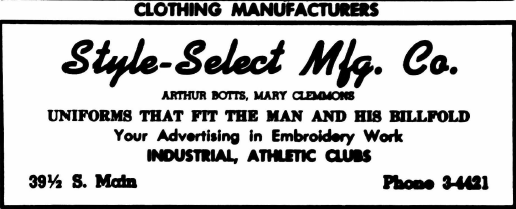
Sources:
Various Daily Nonpareil articles
Des Moines Register article
“EPA Property Details for Former Katelman Foundry” (2010) https://cimc.epa.gov/ords/cimc/f?p=121:31::::31,0:P31_ID:108980